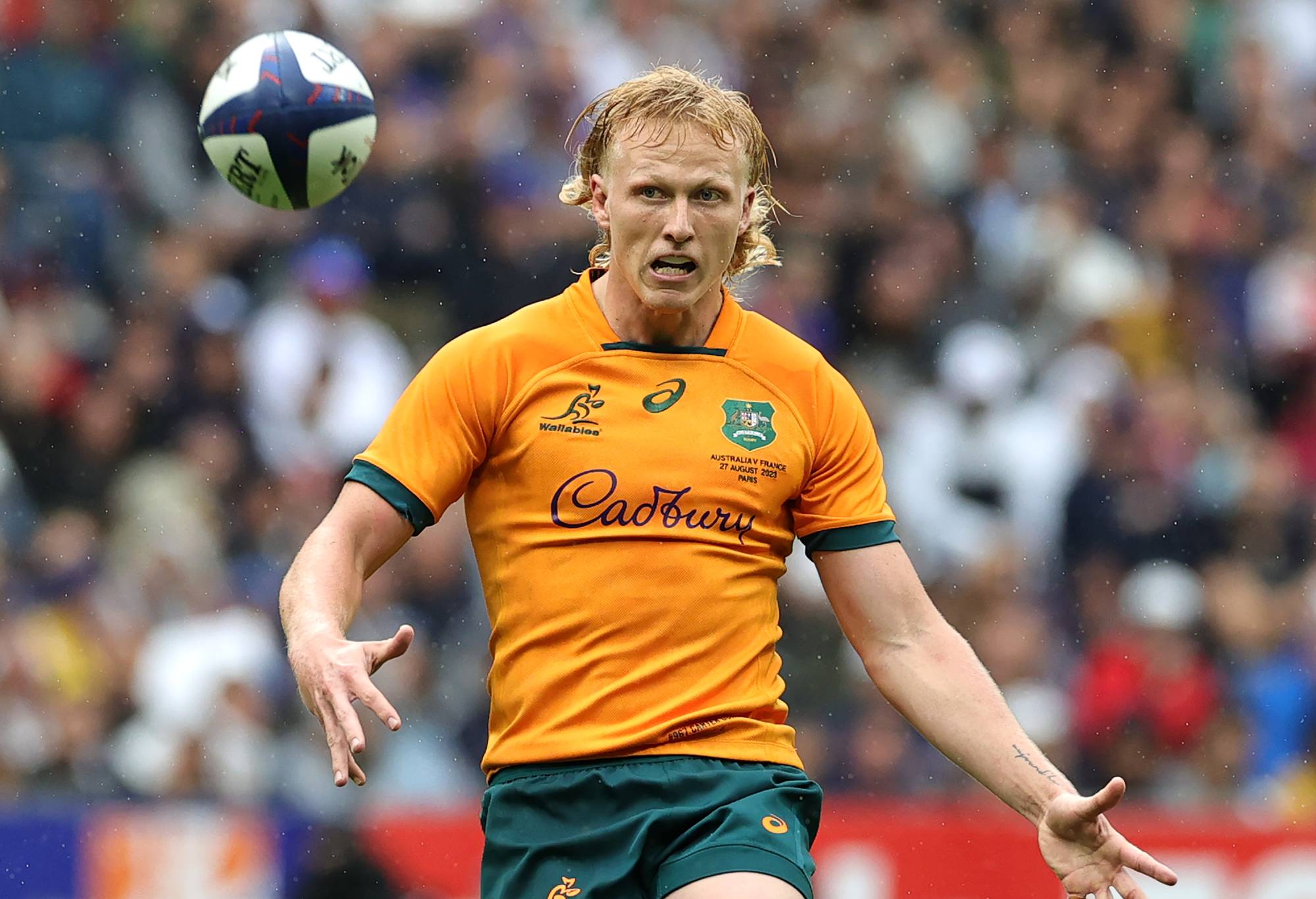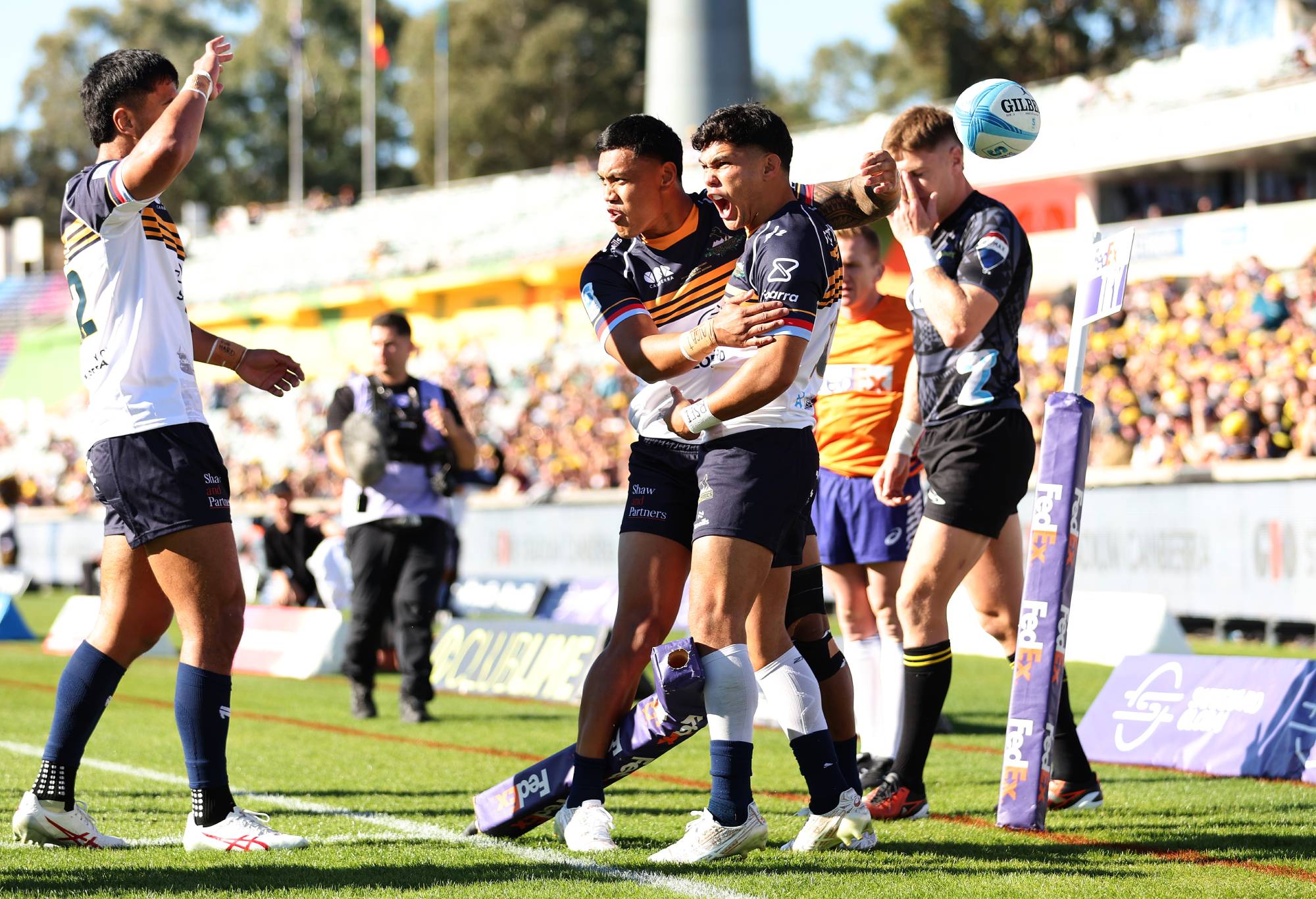Joe Schmidt says he wants Carter Gordon to stay in Australian rugby, but the new Wallabies coach won’t shed tears if he decides to switch codes.
Off contract at season’s end, the 23-year-old, who was one of only two playmakers taken to France by Eddie Jones for last year’s World Cup and started in the opening two pool Tests, is weighing up his next career move.
While the Queensland Reds and NSW Waratahs are both possible destinations should the Melbourne Rebels be culled at season’s end, Gordon could walk away from rugby and back himself to make it in the halves in the NRL.
It’s understood Gordon has already held conversations with the Gold Coast Titans while several clubs in Sydney are also on the hunt for a new playmaker.
That extends to the Sydney Roosters, whose star five-eighth Luke Keary on Monday revealed he would hang up the boots at season’s end.

Joe Schmidt isn’t sweating over whether Carter Gordon stays in Australian rugby. (Photo by David Rogers/Getty Images)
It’s also the destination of World Cup Wallaby Mark Nawaqanitawase, who late last year signed a two-year deal with the Roosters from 2025 – the same year the Wallabies will play the Lions.
Despite Jones’ trust in Gordon last year, the rising playmaker was dropped to the bench for the Wallabies’ must-win clash against Wales after failing to steer the Wallabies to a win over Fiji. It came after tough defeats to the All Blacks and France.
Although Rugby Australia wants to offer Gordon a modest national top-up, the playmaker’s flaws – he is kicking at 69.4 per cent, the lowest of Australia’s goal kickers – have left the door ajar for others to enter the selection mix in what looms at the most open position under Schmidt.
Nor is Gordon the only emerging fly-half either, with all five Australian Super Rugby franchises being led by playmakers under the age of 25.
It’s why Schmidt was unshaken by Gordon’s desire to test the market.
“I had a chat with Carter much earlier in the season and one of the things is that Carter is competing for a Wallaby spot, just like a number of the other 10s,” Schmidt said.
“There are a number of 10s – Tom Lynagh did really well last week, Ben Donaldson’s been going well and Noah Lolesio is the most consistent of the kickers, certainly at goal.
“I’d love Carter to stay and to be in the mix for the Wallabies, but if he doesn’t then I’m excited about working with whoever we do select in that position.”

Wallabies coach Joe Schmidt is confident Australia has the depth to manage players leaving Super Rugby. (Photo by Mark Metcalfe/Getty Images for Rugby Australia)
Gordon’s future in Australian rugby comes as Wallabies centre Hunter Paisami considers a move to Exeter in England, while Waratahs forward Ned Hanigan is also considering joining Lachie Swinton in France.
Nor was Schmidt sweating about the prospect of others leaving Australian rugby either, with the experienced coach aware that when one door closes another opens.
Indeed, Schmidt was on deck in Brisbane to witness Tim Ryan’s extraordinary starting debut against the Blues, where the 20-year-old ran showed up All Blacks star Mark Telea in the process of becoming the fourth Reds player to score a hat-trick in Super Rugby.
Even in NSW, Julian Heaven has made a strong fist of it as the Waratahs’ starting hooker since being elevated from the Shute Shield to Super Rugby amid an injury crisis.
“If we do lose people, we’re disappointed, we don’t want that to happen but if we do, my mindset is let’s get this guy and let’s build a combination and go forward,” he said.
“I love it when someone is unavailable and suddenly we uncover a kid who didn’t just score those tries he finished them superbly and particularly the third one his footwork.”
Schmidt, who was speaking at the Olympic Stadium to coincide with tickets being released for all of Australia’s six home Tests in 2024, said he was buoyed by what he had seen from his eligible players across the country throughout Super Rugby.
One aspect he said all five Australian sides needed to improve on is their consistency, pointing to the heavy defeat the Brumbies suffered against the Blues a fortnight ago before hitting back by defeating the previously unbeaten Hurricanes.
Schmidt said that same inconsistency was a theme of the Wallabies in recent years.
“It’s probably fluctuated [the form of Australia’s Super Rugby sides] a little bit like the Bledisloe’s have in the last two years as well, where being competitive one week hasn’t necessarily materialised into being competitive the next week, and I think driving that consistency of performance is massively important,” he said.
“What happened to the Brumbies in Auckland and what the Brumbies then did last weekend is a fantastic example of the fluctuation in performance that occurs, and trying to build a consistency in that performance is going to be part of the challenge.
“I was at the Blues-Reds game at the weekend, a fantastic game for a neutral supporter I think because the excitement there was fantastic and the way the lead changed hands and the game ebbed and flowed, but just being able to nail those big moments at the finish of those games as well has been a bit of a challenge for the Wallabies in recent years.
“I don’t necessarily have the answer [to solve those issues] but I’ve had some experiences where teams haven’t quite nailed those big moments and trying to build a mindset where you can stay process-driven through those periods [is critical].”

A week after going down to the Blues, Noah Lolesio and the Brumbies responded by beating the previously unbeaten Hurricanes. (Photo by Mark Metcalfe/Getty Images)
Schmidt said building combinations could help, pointing to the All Blacks’ drop off in standard between the two Bledisloe encounters last year where the Wallabies came close to pulling off an upset in Dunedin after Ian Foster made a dozen changes to his side.
“I know when you make a lot of changes that can be one of the variables that upsets individual performance,” he said.
“I think a good example of that is last year in Dunedin with 12 changes, we kind of destabilised the performance level of the New Zealand team at that time.”
Building combinations and rewarding the talent in Australia is one of the reasons why Schmidt isn’t looking to immediately look overseas to help fill the Wallabies.
That stance would contrast Eddie Jones, who picked four players from overseas, including captain Will Skelton, for his World Cup squad.
Schmidt didn’t rule out calling on players from overseas, saying he thought he wouldn’t know his best Wallabies side until December, but once again reaffirmed his stance that picking from within Australia remained his preference.
“To be frank, it probably isn’t something we’ve planned,” he said.
“We’ve always been consistent in the messaging around prioritising the players who are playing locally and the reasons for that.
“It looks like we’re a little bit more competitive in Super Rugby this year. We want to be more and more competitive in Super Rugby and you don’t do that if your best players don’t stay and commit and play within the Super Rugby teams that are based here.
“We want people who come to the Super Rugby games to see the best players that we’ve got, not to watch them in European games or in the top league from a distance.
“At the same time, there are guys that may potentially return to Australia or there are maybe gaps that we feel in the shorter term we just need to make sure that we’ve got the balance or the ability to run a game as best we can to be as competitive as we can be.
“I wouldn’t rule it out completely, but it’s not our priority.”
He added: “I think we make sure that we can get as much time with the players, and the players have that time in combinations that they play in in the Super Rugby clubs, so that we can build the cohesion that we’re going to need.
“When you look at the All Blacks when they play, when they’re very good, a number of combinations are coming out of Super Rugby or combinations that get built over a number of years in the All Blacks that make that happen.
“It’s the same with Ireland at the moment. A lot of those combinations, the whole front row, just about the reserve front row, they all come from the same club [Leinster] and therefore they know each other and they combine well, and that cohesion is really important.
“At this point, we’d never say never but our priority is the home-based players.”































































































